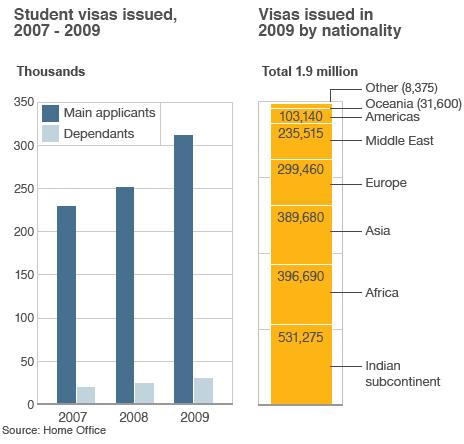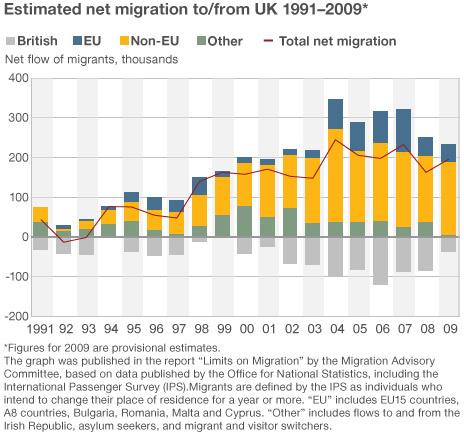Cut non-EU migrant workers by up to 25%, ministers told
- Published

The government plans to introduce a "cap" on immigration
The number of migrant workers coming to Britain from outside the EU should be cut by between 13% and 25% next year, government experts have said.
But even this will only contribute 20% to the government's target of reducing UK immigration to "tens of thousands", says the migration advisory committee.
The other 80% cut would have come from student and family migration, it adds.
The committee's advice will help ministers in setting the cap, which will come into effect next April.
Committee chairman Professor David Metcalf said the number of visas for skilled workers issued under what is called Tier One and Tier Two needs to be between 37,400 and 43,700 for 2011/12.
This would represent a cut of up to 12,600 from the 50,000 in 2009, he said.
Immigration minister Damian Green said the government would announce their decision on the cap "shortly".
Job offers
He said: "Bringing down net migration to sustainable levels will not be easy. We will not be able to achieve it by focusing on just one area of the system or on one route into Britain.
"By introducing an annual limit we will reduce the number of people who come to the UK to work from outside the EU.
"But this is just one of the ways we intend to reduce the level of net migration back down to the tens of thousands each year."
He insisted the cap could be introduced without damaging Britain's economy.
The government has already made a major concession to industry, by exempting intra-company transfers from it, which account for the majority of skilled workers coming into the UK through Tier Two of the points-based system.
The committee's report also paves the way for a clampdown on people entering the UK on elite Tier One visas, meant for the "brightest and best" migrants.
This is the only category of non-EU migrant allowed to enter the UK without a job offer, but research by the the UK Border Agency has found almost one in three migrants who came in through this route were in menial roles such as shop assistants, security guards and supermarket cashiers.
Home Secretary, Theresa May has said that Tier One of the visa system should only be used by investors, entrepreneurs and people of exceptional talent.
And the committee's report backs this up, recommending that Tier Two visas, for skilled workers with job offers, should be prioritised over Tier One visas.
Student migration
The report also calls for more effort to ensure British workers were trained up so that businesses can recruit the skilled people they need, without having to bring them in from abroad. EU citizens, with the exception of those from Romania and Bulgaria, are free to work in the UK without restrictions.

Prime Minister David Cameron has said he wants to bring net migration down from 196,000 a year to "tens of thousands" by 2015, despite pleas from industry and universities who claim their ability to recruit top level scientists and researchers could be harmed.
Prof Metcalf said: "It is not possible to reduce net migration to the tens of thousands by limiting work-related migration alone.
"The committee assumes that work-related migration takes 20% of the total cut - its fair share - which implies that family and student migration must take the other 80%."
In September, Theresa May announced an interim cap, limiting the number of non-EU workers allowed into the UK to 24,100 - down around 5% - to April 2011.
But the Commons home affairs committee said in a report earlier this month that the government had no chance of fulfilling its pledge to cut immigration without further curbs on international students and those joining family members in the UK.
Migrants may even have to be stripped of their right to settle in the UK in the long term to bring the numbers down, the MPs said.
It found the proposed cap could affect fewer than one in 100 migrants entering the UK.
Shadow home affairs minister Gerry Sutcliffe, for Labour, said the immigration cap was the "worst of all worlds".
"It does very little to control immigration but is bad for business and scientific research at this critical time for our economy.
"The government needs to go back to the drawing board and rethink the whole policy."

- Published9 November 2010
- Published5 November 2010
- Published7 September 2010